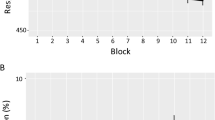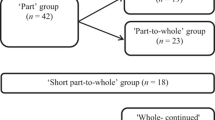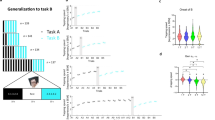Abstract
The goal of the current study was to explore learning and short-term retention using a modified serial reaction time task. The multi-finger sequence task was designed to present repeated and random sequences in a completely interleaved fashion, giving participants within block, variable practice, on the two types of sequences. Eighteen younger adults (M age = 24 years) and 15 older adults (M age = 65 years) participated in the experiment. Participants were asked to respond on a piano keyboard to a visual stimulus that appeared in one of four squares on the computer screen. They were not informed that one of the sequences presented would repeat. Sequence-specific learning, within-day and across-days, was inferred from differences in accuracy and reaction time between repeated and random sequences. Age equivalence was observed in sequence-specific learning and retention across days, and suggests that older adults may benefit from variable practice.


Similar content being viewed by others
References
Bennett IJ, Howard JH, Howard DV (2007) Age-related differences in implicit learning of subtle third-order sequential structure. J Gerontol Psychol Sci Soc Sci 62B:P98–P103
Cherry KE, Stadler MA (1995) Implicit learning of a nonverbal sequence in younger and older adults. Psychol Aging 10:379–394
Cohen A, Ivry RI, Keele SW (1990) Attention and structure in sequence learning. J Exp Psychol Learn Mem Cogn 16:17–30
Curran T (1997) Effects of aging on implicit sequence learning: accounting for sequence structure and explicit knowledge. Psychol Res 60:24–41
Daselaar SM, Rombouts SARB, Veltman DJ, Raajmakers JGW, Jonker C (2003) Similar network activated by young and old adults during the acquisition of a motor sequence. Neurobiol Aging 24:1013–1019
Dick MB, Andel R, Hseih S, Bricker J, Davis DS, Dick-Muehlke C (2000) Contextual interference and motor skill learning in Alzheimer’s disease. Aging Neuropsychol Cogn 7:273–287
Frensch PA, Miner CS (1994) Effects of presentation rate and individual differences in short-term memory capacity on an indirect measure of serial learning. Mem Cogn 22:95–110
Hoddes E, Zarcone V, Smythe H, Phillips R, Dement WC (1973) Quantification of sleepiness: a new approach. Psychophysiology 10:431–436
Howard DV, Howard JH (1989) Age differences in learning serial patterns: direct versus indirect measures. Psychol Aging 4:357–364
Howard DV, Howard JH (1992) Age differences in the rate of learning serial patterns: evidence from direct and indirect measures. Psychol Aging 7:232–241
Howard JH, Howard DV (1997) Age differences in implicit learning of higher order dependencies in serial patterns. Psychol Aging 12:634–656
Howard DV, Wiggs CL (1993) Aging and learning: insights from implicit and explicit tests. In: Cerrela J, Rybash JM (eds) Adult information processing: limits on loss. Academic Press, San Diego, pp 511–527
Howard DV, Howard JH, Japiske K, Di Yanni C, Thompson A, Somberg R (2004) Implicit sequence learning: effects of level of structure, adult age, and extended practice. Psychol Aging 19:79–92
Howard JH, Howard DV, Dennis NA, Yankovich H (2007) Event timing and age deficits in higher-order sequence learning. Aging Neuropsychol Cogn 14:647–668
Ketcham CJ, Stelmach GE (2001) Age-related declines in motor control. In: Birren J, Schaie KW (eds) Handbook of psychology of aging, 5th edn. Academic Press, San Diego, pp 313–348
Kramer AF, Hahn S, Gopher D (1999) Task coordination and aging: explorations of executive control process in the task switching design. Acta Psychol 101:339–378
Krampe RT (2002) Aging, expertise and fine motor movement. Neurosci Behav Rev 26:769–776
Lee TD, Magill RA (1983) The locus of contextual interference in motor skill acquisition. J Exp Psychol Learn Mem Cogn 9:730–746
Lee TD, Magill RA (1985) Can forgetting facilitate skill acquisition? In: Goodman D, Wilberg RB, Franks IM (eds) Differering perspectives in motor learning, memory, and control. Amsterdam, Elsevier, pp 3–22
Meulemans T, Van der Linden M, Perruchet P (1998) Implicit sequence learning in children. J Exp Child Psychol 69:199–221
Nissen MJ, Bullemer P (1987) Attentional requirements of learning. Evidence from performance measures. Cogn Psychol 19:1–32
Schmidt RA (1998) Motor control and learning: a behavioral emphasis. Human Kinetics, Champaign
Seidler RA (2006) Differential effects of age on sequence learning and sensorimotor adaptation. Brain Res Bull 70:337–346
Shea JB, Morgan RL (1979) Contextual interference on the acquisition, retention, and transfer of a motor skill. J Exp Psychol Hum Learn Mem 5:179–187
Smith CD, Walton A, Loveland AD, Umberger GH, Kryscio RJ, Gash DM (2005) Memories that last in old age: motor skill learning and memory preservation. Neurobiol Aging 26:883–890
Song S, Howard JH Jr, Howard DV (2007) Sleep does not benefit probabilistic motor sequence learning. J Neurosci 27:12475–12483
Spencer RMC, Gouw AM, Ivry RB (2007) Age-related decline of sleep-dependent consolidation. Learn Mem 14:480–484
Spirduso WW, Francis KL, MacRae PG (2005) Physical dimensions of aging, 2nd edn. Human Kinetics, Champaign
Stradler MA (1993) Implicit serial learning: questions inspired by Hebb (1961). Mem Cogn 21:819–827
Strickgold R, Walker MP (2005) Memory consolidation and reconsolidation: what is the role of sleep? Trends Neurosci 28:408–415
Walker MP, Strickgold R (2004) Sleep-dependent learning and memory consolidation. Neuron 44:121–133
Walker MP, Brakefield T, Morgan A, Hobson JA, Strickgold R (2002) Practice with sleep makes perfect: sleep-dependent motor skill learning. Neuron 35:205–211
Walker MP, Strickgold R, Alsop D, Gaab N, Schlaug G (2005) Sleep-dependent motor memory plasticity in the human brain. Neuroscience 133:911–917
Wechsler D (1981) Manual of the Wechsler adult intelligence scale—III. Psychological Corporation, New York
Willingham DB, Goedert-Eschmann K (1999) The relation between implicit and explicit learning: evidence for parallel development. Psychol Sci 10:531–534
Acknowledgments
This project was funded by a Natural Sciences and Engineering Research Council of Canada PhD scholarship awarded to S.F. and a Canadian Institutes of Health Research operating grant awarded to K.L. and V.P. (MOP-67757, 68807). Many thanks to Alejandro Endo for his programing efforts, and to Anne Bailey and Caroline Doramajian for their help with this project.
Author information
Authors and Affiliations
Corresponding author
Rights and permissions
About this article
Cite this article
Fraser, S.A., Li, K.Z.H. & Penhune, V.B. A comparison of motor skill learning and retention in younger and older adults. Exp Brain Res 195, 419–427 (2009). https://doi.org/10.1007/s00221-009-1806-5
Received:
Accepted:
Published:
Issue Date:
DOI: https://doi.org/10.1007/s00221-009-1806-5




